- Home
- Jim Thompson
Cropper's Cabin Page 3
Cropper's Cabin Read online
Page 3
“Me, I don’t matter. The Lord put his curse on me long ago, and there ain’t nothin’ left but atonement. I lost my license to live. The Lord Jehovah took it away in His righteous wrath, an’ I could no longer dwell in His image, and He gave me penance…”
He went on talking, mumbling, with me putting in a “Yes, sir,” now and then, but not really listening. I’d heard the same talk, with variations, a thousand times before, from him and at the backwoods revival meetings I was dragged to. I never could cipher out how people with so much work to do and so little money could do so much sinning. But they all seemed to do a lot.
We came to the long grove of cottonwoods that led up to the plantation. We came out of it and paused, staring at the big white house with its columned portico; and I heard Pa swallow hard. We went on, our feet dragging a little, and the road began to branch off into graveled, cedar-lined drives, and Pa stopped again.
He looked at me, waiting, and I knew what he wanted me to say.
“Think we ought to go around to the back, Pa?”
“What for? Why’n’t we march right up to the front?”
“Well, it’s closer around to the back,” I lied. “I don’t see why we should put ourselves out any for him.”
“Yeah. Well…”
“Anyway, he’ll be making a late patrol before he turns in. We may be able to catch him out at the stables.”
He gave in, like he’d intended to in the first place. We followed the drive around to the rear, and headed across the back lawn to the outbuildings. There was a passel of them, all painted white, spread out along neat drives and walks like a little city. Dairy barn, hog sheds, chicken houses, smoke house, implement sheds, blacksmith shop, stables…
I hadn’t actually believed we’d find him there. I’d meant to rouse up one of the hands and send him to the house with a message. But there he came, Matthew Ontime, I mean. We were a few paces short of the stable door when he came through it, leading one of his big bay riding horses.
He saw us and stopped. Then he dropped the reins of the horse and came toward us.
He was probably as old as Pa, but he looked twenty years younger. His shoulders seemed a yard broad under his suede jacket. His head was bared, and the thick barbered hair was as black as Donna’s. And his teeth were as white and even. He spoke pleasantly, in a voice that was something like hers, slapping the riding crop against his corduroy trousers.
“Mr. Carver,” he nodded to us. “Tom.”
It was a big courtesy, his calling Pa mister, but he might not have meant it as such. Knowing what he did about Pa, he may have done it for his own sake. A man like him had to be mistered, and this was the only way he could swing it.
“Is this a social visit”—there was the faintest edge to the words—“or business? I don’t want to hurry you, but I was just…”
“It’s about the oil,” said Pa.
“Oil? Coal oil, you mean? You need some kerosene for the house?”
“No, that ain’t what I mean,” said Pa. He knew he’d started off wrong, sounded foolish, and it got his dander up. “I’m talking about the oil under my land that I can’t get out account of you.”
“I see. Perhaps I’m in error, but I thought I’d explained my position on that matter.”
“I had another offer today. Twenty-five hundred an acre. Twenty-five thousand in cash, against a eighth royalty.”
“And?”
“And,” said Pa. “That’s all you can say, and? I ain’t fitten for field work much longer and I ain’t got no way of helpin’ Tom—help him to be somethin’ aside what I been—I ain’t got nothin’ and I can’t never get nothin’ except this way. An’ you stand there an’ say and!”
Matthew Ontime had stopped swinging the riding crop. For the first time he sounded really friendly instead of put-on friendly. “Believe me, Mr. Carver,” he said, “I can understand your feelings and sympathize with them. But I think there must be some solution to your problems, other than turning a five-thousand-acre plantation, with sixty families on it, into an oil field. Tom’s an excellent scholar”—he smiled at me—“Yes, I know your reputation, Tom…”
“Thank you,” I said.
“I’m sure he could get a scholarship and a student loan, and…”
“An’ how about the farm? How’d I keep it goin’ without him to help?”
“You’re cropping forty for me now? Cut it down to twenty and I’ll increase your share enough to make up for the cut.”
“We don’t want no gifts,” said Pa. “All we want is what we’re entitled to.”
“Well, I’m afraid…” Matthew hesitated. “What did you pay for your ten, Mr. Carver? Fifty—fifty-five an acre?”
“Fifty. But…”
“I know. You’ve put in a great many improvements, done wonders with it. So suppose I do this, since you’re dissatisfied and need ready cash. You can go on cropping shares with me, as much or as little land as you like, and I’ll take the ten off your hands. I’ll give you a hundred and a quarter—no, I’ll make that a hundred and fifty an acre.”
“A hundred and fifty!” Pa yelled it out.
“Yes. That seems fair, don’t you think so, Tom?”
It was much more than fair. But even if I’d been of a mind to say so, I didn’t get the chance.
“Fair!” Pa yelled. “I just got through tellin’ you I was offered twenty-five hundred a acre!”
“But that was for the mineral rights.” Matthew spoke carefully, like he was talking to a child. “It’s not worth that as farm land.”
“ ’Course it ain’t! Why else’d I be wantin’ to lease it for oil?”
“But…” Matthew laughed shortly, irritably. A lot less irritably, I reckon, than he felt. Reaching behind him he grasped the reins of his horse. “Don’t you think, Mr. Carver,” he said, “you’re being just a little unreasonable?”
“What’s unreasonable about wantin’ twenty-five thousand dollars? I got a right to it, ain’t I? It’s my land, ain’t it?”
“And the five thousand adjoining acres are mine. Surely, you can’t expect me to…”
“Naw, I don’t expect you to! Don’t expect you to do nothin’ that’s decent an’ makes sense! You don’t need money. You got yours, an’ you don’t care if anybody else has nothin’ or not!”
“Now, Mr. Carver…”
“To heck with you!”
“Please. You’ve come here to get this matter straightened out. Now, let’s get it straight…”
I was getting pretty puzzled; puzzled along with the uneasiness. Because Matthew Ontime didn’t have to take lip from anyone, let alone a sharecropper, and he’d never been known to do it. Until now. I almost shook my head, wondering, watching the straight, proud way he stood, watching the flash of his black eyes, the white even teeth. And the reason came to me—the only reason he could have for doing it. And I felt awfully happy, but also sad. And scared.
I remember how Donna had been the day I’d stopped to fix her tire. Cool and pleasant one second, a devil out of hell the next.
“… the only thing that’s real, Mr. Carver. You know how much just a little land can mean to a man. Growing land. Land held in fee simple. You can take care of it, and it takes care of you. Now, it’s true that I have far more than the average share, but—well, that’s the point, in a way, don’t you see? Why should I sacrifice a way of life, and the principles I live by, to get more? Now…”
“Yeah, but I ain’t…”
“Let me finish, please. Let’s examine every side of this question. It takes years before land that’s been drilled for oil can be brought back to farm land. Sometimes it can never be brought back. It’s worthless, eroded and gullied, soaked with oil and salt water. And what happens to the people who farm that land? What would happen to the sixty families who work this plantation?”
Pa grunted. “What do I care what happens to ’em? A bunch o’ white trash an’ niggers and half-breeds!”
“I see,” said Matthe
w Ontime, slowly. “Is that your attitude also, Tom?”
“You’re talkin’ to me,” snapped Pa.
“I’m speaking to Tom. What about it, Tom?”
I waited. Pa jerked his head. “Go ahead, boy. Answer him.”
“Yes, sir,” I said. I forced the words out. “That’s my attitude.”
“I’m sorry. But perhaps it’s just as well. Now, you’ll have to excuse me.”
He started to turn toward his horse. Pa leaped forward and caught him by the arm. “I ain’t through talkin’ to you, you…!”
I couldn’t see what happened, it was so fast. But Pa suddenly rose up in the air, and when he came down again he was a good two yards from where he’d been standing. He landed on his feet, upright, but it took all of the breath out of him.
“It would seem,” said Matthew Ontime, quietly, “that I’m not through talking to you either. You’re not cropping for me any longer, Carver. I’m dividing your forty among my other tenants.”
“B-but what’ll I…”
“I don’t give a damn, Carver. But if I find you on my land after tonight, you’ll be treated as a common trespasser.”
He nodded curtly and put a hand on the saddle pommel. And Pa was screaming, “You dirty half-breed! You…!” And Matthew was on the horse, and the horse was wheeling, rearing, its hooves raised high in the air. And Pa stumbled backwards and fell, rolled screaming but no longer cursing. And the hooves came down, barely missing him, and raised high again.
I came to my senses and sprang.
I took a running spring, arms spread. And Matthew Ontime came out of the saddle with me on top of him. I clubbed my fist and hit him once, twice. Then I staggered up, back, looking down at him, at her, watching him as he sat up, brushing blood from his face.
“What you bawlin’ for? What’s the matter, you idjit?”
Pa was shaking me by the arm. Pulling me toward the road. “Come on, dang you! We hang around here an’…”
The barnyard floodlights were coming on, and doors were slamming, and heavy feet were pounding toward us.
We ran.
5
It rained during the night and it was still misty in the morning. But Pa was off for town the minute he’d gulped his breakfast. He knew that Matthew Ontime would have too much pride to put the law on us for what had happened, so he couldn’t get into town fast enough. He could go around crowing about how we’d beaten up one of the richest men in Oklahoma, and he’d be perfectly safe.
I set off for school earlier than I usually did, almost looking forward to the trouble I’d find there. You know—or maybe you don’t. Maybe you don’t know how it is when you’re so sick inside, sick and hopeless-feeling, that you want someone to cross you a little; just enough so’s you’ll have an excuse to make them feel bad, too.
Ordinarily, at least in the winter when the land was fallowing, I cut across fields to the county road. But this morning I had to go around by the plantation road, the one Donna’d brought me home on. There wasn’t any doubt in my mind that Matthew Ontime’d meant just what he said about trespassing. As far as that plantation went, he was the law; in fact, both of his overseers had deputy sheriff commissions. They wouldn’t haul you into court unless they caught you stealing or some such thing. But they were apt to make you wish that they would take you to court.
I walked along in the mist, my sweater dampening.
Down near the intersection of the county, Nate Laverty whistled at me; and he and his brother Pete came running down the path from their shack. They were big, thin, bucktoothed kids, about my age but several grades behind me. Pete asked me why’n hell I was all bundled up in a sweater. I didn’t see him and Nate wearing sweaters, did I? What kind of a sissy was I? he laughed.
“You haven’t got a sweater,” I said. “You haven’t got anything but those ragged-assed overalls and your mealbag shirts.”
Nate’s face fell. Pete tried to spit, easy like, like he hadn’t heard me; and his teeth got in the way, spilling it over his chin.
“Shucks,” I laughed. “Don’t you know when a man’s kidding? Why, if I hadn’t made the football team I’d have been worse off’n you guys.”
“What you mean, worse off’n us,” said Pete. “We’re doin’ all right.”
“Goddammit!” I yelled; and they stopped, startled. They knew I’d never cursed before. “Goddammit”—it was easy now—“stop picking me up on everything!”
“Hey,” said Pete, “someone been steppin’ on your tail, boy?”
“I—Pa and I had a run-in with Matthew Ontime. He’s takin’ our acreage away from us.”
“Yeah?” Their eyes got wide. “How come?”
“Because he’s a no-good son-of-a-bitch, that’s why!”
“Mr. Ontime? You must be talkin’ about someone else, fella.”
“Goddammit, I’m talkin’ about…”
“Yes, sir,” said Pete, firmly, “you sure must be talkin’ about someone else. There never was a fairer man than Mr. Ontime nowheres!”
The school doors were open, because of the drizzle, and we went on in. They left me on the first landing, since their homerooms were on that floor. I went up the stairs to the second. And there was Miss Trumbull, waiting for me.
She smiled and spoke, her pince-nez glasses sparkling so’s you couldn’t see her eyes. She was a prim, pretty strict old lady, and a lot of the students didn’t like her. But she’d always been awfully nice to me.
“Will you step into Mr. Redbird’s office with me, Thomas? I told him we’d be in as soon as you arrived.”
“What for?” I said. “I haven’t done anything.”
“Certainly you haven’t. Mr. Redbird knows it and I know it.”
“Well, then…”
“Come along, Thomas.” She took me by the arm, and I went along.
We went into the principal’s office, and she closed the door. He smiled at her and winked at me, and we sat down on the other side of his desk.
He was dark, of course; dark-haired and dark-eyed. He taught my science class, along with being principal, and we’d always got along real well.
“Well, Tom,” he grinned, “we have a terrible accusation against you. Our esteemed custodian, Mr. Toolate, tells us…”
“I know what he told you. Why’n’t you have him here to tell me?”
“Well, now…”
“That awful man!” Miss Trumbull clucked her tongue. “I really can’t blame Thomas for being annoyed.”
“He’s not worth getting annoyed,” Mr. Redbird shrugged. “We have to put up with him, it seems, but—Tom, just what was the trouble? There’s been some light-fingered work around here in…”
“Yes, and you know who’s behind it!”
“I’ve got a pretty good idea, yes. Tell us what happened. Were you teasing Abe—trying to get a rise out of him?”
“He tried to get smart with me,” I said, “and I threw a scare into the dirty half-breed!”
“Thomas!” said Miss Trumbull. And her face went all tight and funny.
But Mr. Redbird kept on smiling. “Tell me you didn’t put anything in your pocket, Tom,” he said. “That’s all you need to do.”
“I suppose you’d take my word against his!”
“Of course I would.”
I hesitated. But I was so sick inside, and what was the use anyway. “Sure you would! You’d side against one of your own kind! Why do you try to cover it up, anyway? Why’n’t you spell your name right—Red Bird—instead of pushin’ yourself off as a white man? Why…”
“Get out,” he said, “get out, get out, g-ggg…”
Miss Trumbull jumped up in front of me. She jerked me up and whirled me around and shoved me out the door, and she sure moved fast and strong for a little old lady.
“Get your books, Thomas! You’re on indefinite suspension.”
“Shove the books,” I said. “I’m not coming back.”
And I ran down the stairs and out of the building. I heard her fa
intly, calling after me, “Thomas! Thomas Carver!” Then the bell for the first class started ringing; and I couldn’t hear anything else. The sound followed me down the road, and I had to bang my ears with my palms to drive it away.
I came to the draw under the willows where Donna usually parked. I walked back in under the trees and hunkered down against a rock, thinking if I sat there awhile, maybe until noon, she’d show up. Because she had done that several times. She’d drive by the school, just before twelve, signaling with the horn. And I’d run down at noon, and we’d have as much as a half-hour together. But—but I didn’t reckon she’d be here today.
Not today or any other day.
I walked on toward home, and the mist turned into a hard, chilling rain. I was soaked in no time, and I hardly seemed to notice. It just didn’t matter.
Donna. Donna…
“Huh-uh, boy. Never again.”
“But I could! I could slip up there at night…”
“Yeah. And maybe get your tail shot off!”
“I got to try! She’d listen, anyway, wouldn’t she? She’d at least listen. Wouldn’t a woman listen to the only man that…”
“Listen? What’d you say to her? And suppose you could smooth over last night—after she’d bragged you up to him? What’ll you say then? To hell with Pa? I’m my own man? You name it and I’ll do it?”
“I—maybe.”
“Not you, boy. Huh-uh.”
“You wait!” I yelled. “Maybe I will.”
I shook myself. It was like coming out of a bad dream and I felt kind of rested and eased. I brushed the water, rain, I guess it was, out of my eyes. I started running, and I ran the rest of the way home.
I stopped on the porch, and kicked the mud off my shoes. I wiped them solewards and sideways against the sacking Mary had laid out. I went into the kitchen.
“Well,” said Pa. “What you doin’ home?”
He was sitting down with his jeans’ legs rolled up and his feet in a pan of water. He looked mighty sour. I figured he hadn’t had such a good time bragging about Matthew Ontime getting his come-uppance.
“What you doin’ home?” he repeated. “Why ain’t you in school?”

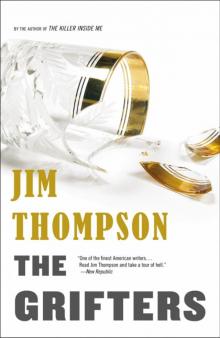 The Grifters
The Grifters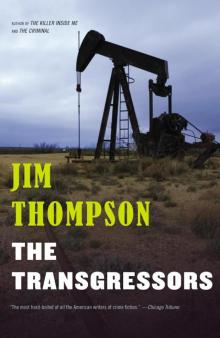 The Transgressors
The Transgressors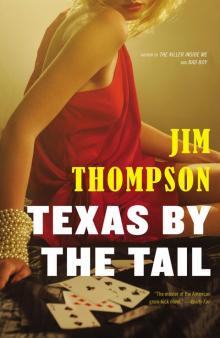 Texas by the Tail
Texas by the Tail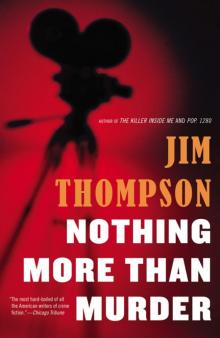 Nothing More Than Murder
Nothing More Than Murder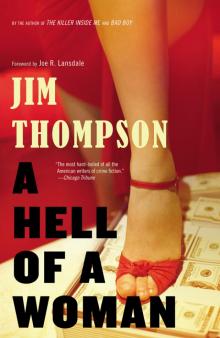 A Hell of a Woman
A Hell of a Woman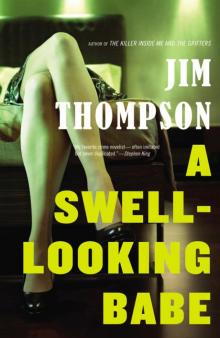 A Swell-Looking Babe
A Swell-Looking Babe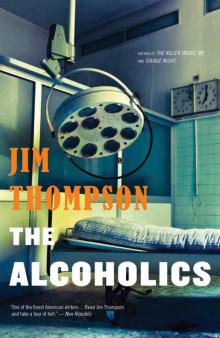 The Alcoholics
The Alcoholics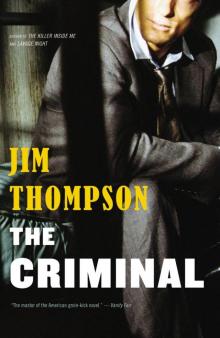 The Criminal
The Criminal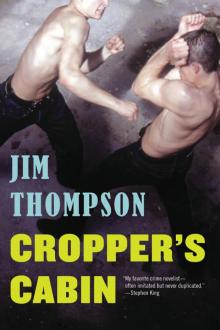 Cropper's Cabin
Cropper's Cabin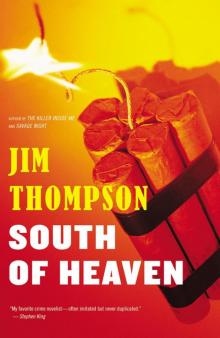 South of Heaven
South of Heaven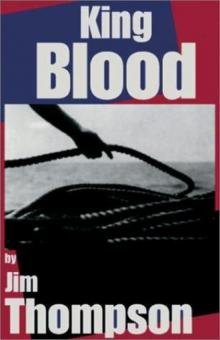 King Blood
King Blood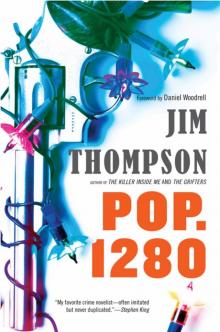 Pop. 1280
Pop. 1280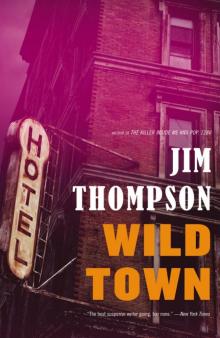 Wild Town
Wild Town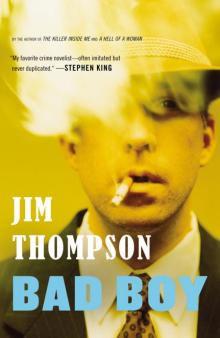 Bad Boy
Bad Boy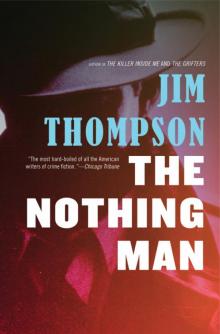 The Nothing Man
The Nothing Man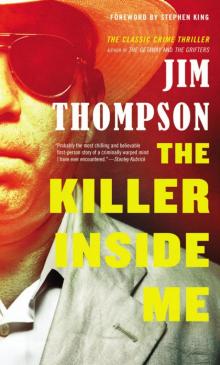 The Killer Inside Me
The Killer Inside Me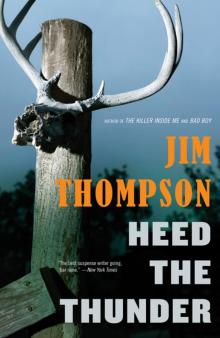 Heed the Thunder
Heed the Thunder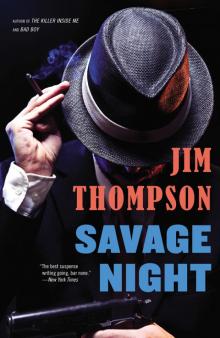 Savage Night
Savage Night Recoil
Recoil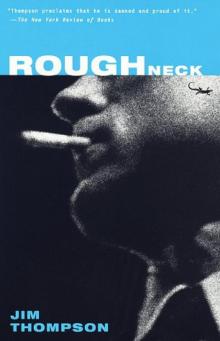 Roughneck
Roughneck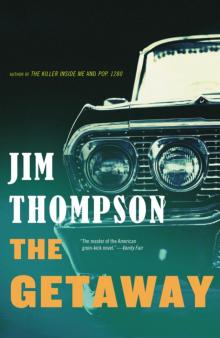 The Getaway
The Getaway